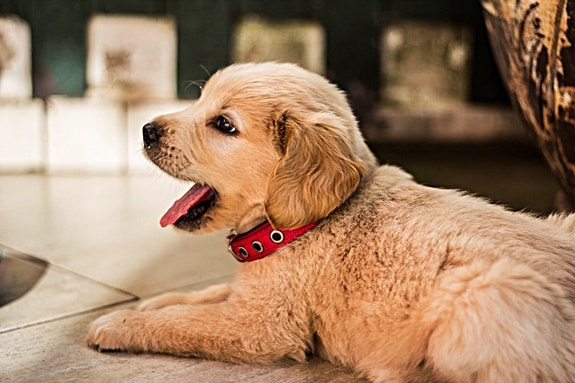Why Is My Dog Panting and Restless?
One questions me arise in your mind that why is my dog panting and restless? Dogs will often pant when they get hot, and it is basically their method of sweating. If you are not familiar with that particular canine bodily function, it looks like they are breathing heavily with their tongue hanging out.
They will usually stop what they are doing and just stand or sit while keeping their mouth open. Your dog may do this for a few minutes at a time and it’s perfectly normal, but there may be times where it seems like your dog is both panting and restless and is acting unusual.
Why This Is Cause for Concern?
Panting isn’t usually followed by restlessness. Typically, when your dog is panting, it is trying to relax, catch its breath and cool down. There isn’t much reason for it to be restless at that time, so when you see both restlessness and panting, it may be cause for some alarm.
A restless dog won’t stay still and may seem difficult to calm down. Even if you try to restrain your dog, he or she may pull away from you and seem skittish or fidgety.
It seems like nothing will get your dog’s attention in this state, even talking to your dog with soothing words and presenting treats or toys for your dog to play with may not have much effect.
That’s because there is something going on with your dog that is not always apparent on the surface. You can probably tell that something is wrong with your dog just by looking at its behavior.
It definitely won’t seem normal, as your dog keeps moving around while panting, because dogs will usually stand still to pant, allowing their body to cool down and excess moisture to dry up. That’s not possible when they are fidgety.
The Causes of Panting and Restlessness
Most people understand why their dog may be panting and why it may be restless, but when it does both at the same time, the reasons are harder to understand. Let’s look at why this can happen so that you can better understand how to make it better:
- Your dog is suffering from a hormonal imbalance
- Your dog is scared of something in its environment
- Your dog’s diet has changed
- Your dog is in pain
- Your dog is adversely affected by medications
There may be other reasons, particularly related to health problems, but these are the most common reasons why your dog will behave in this way. Let’s break each of them down a bit further.
Hormones
Hormonal problems can be caused by all sorts of factors. Serious medical problems like Cushing’s disease can cause a hormonal imbalance.
If your dog has too much cortisol in its system, that can lead to imbalanced hormones too. There are some signs that you can look for that indicate that your dog has too few or too many hormones at the moment:
- Excessive tiredness
- Loss of hair
- Excessive drinking
- Excess weight gain
- Inability to function at full strength
Look for these indicators that tell you that something is wrong with your dog, as they could tell you more about why your dog is both panting and restless.
Fear
If your dog is uneasy, then it may be experiencing palpitations and it might sweat profusely. These are the same things that happen to the human body when a person becomes scared. If you take your dog in an airplane, on a long car ride, to the vet or you put it in an enclosed space, then your dog may become very scared.
It will start to fidget and move around restlessly, and it will probably sweat as well. The increased heart rate will both cause sweating and make it hard for the dog to stand still, which can be what is causing the symptoms you are seeing.
Dogs may also act like this if they are around strange or threatening dogs or if something in their environment is spooking them. Consider that what is wrong with your dog may not be a medical problem so much as it is an environmental one.
Diet Changes
If you are feeding your dog differently than you used to, or your dog is finding food elsewhere, then that cause internal changes. A new diet can be uncomfortable for your dog, and its body may not adjust very well to the changes.
Your dog may feel differently and thus act differently. Its energy levels may be higher or lower, and its body may react in strange ways.
You may not always be the cause of the new diet and the changes your dog is going through, so if you know that you are not giving your dog anything different from what it is used to, then you should look for other food sources that it may be getting into.
Pain
Physical pain can also cause erratic behavior in your dog. Your dog cannot speak and say it is in pain and tell you what is causing the pain. Changes in behaviors, such as heavy panting and restlessness, can be caused by some sort of pain your dog is feeling.
If the dog is injured, then it may not want to stay still due to the location of the injury. A foot injury can definitely lead to restlessness, as it can be uncomfortable for your dog to put any weight on the foot, and your dog may be uncertain of how to stop the pain.
If your pet is in pain, then it may also have dilated pupils, a lack of appetite, and anxiety. Your dog may also try to lick or bite the injured spot, and it may not want to lie down.
The injury is not always an external one, so even when you see nothing visibly wrong with your dog, it could still be injured. If it fell or impacted something hard, then there could be an internal injury that you may not be seeing.
Medications
If your dog has started taking a mediation, then that can have an effect on how it is behaving and feeling. Prednisone is especially likely to cause heavy panting in your dog, and if your pet does not know why it is panting, that can lead to restlessness.
Apoquel is typically used to treat allergies, so if your dog is being treated for that condition, there is a chance that it may contain apoquel. Find out apoquel alternatives.
What Not to Do
If you see your dog panting and behaving restlessly, then there are some things you may want to do to help that will actually make the situation worse for your dog.
First of all, you do not want to ignore your dog. Don’t think that the problem will just go away on its own, as every one of the reasons we gave you as to why your dog may be acting this way requires treatment or a change being made in order to correct it.
We will talk in a moment about what you can do to treat the problem, but for now, you need to know that inaction is the worst course of action, in most cases.
You may also be tempted to give your dog medication to treat the problem, but if your dog’s veterinarian has not prescribed anything for this behavior, you are putting your dog at risk by trying to self-medicate it.
Even giving your dog its regular medication can be dangerous, and it is always best to check with a veterinarian first if you have that option.
How to Care for Your Dog’s Condition
The way you treat your dog’s problem is to first determine what is causing it. If there is a problem within its environment and something is scaring your dog, that’s often the easiest factor to pin down. Consider first of all if there is anything that could be scaring your dog and making it act erratically.
If you are doing something new with the dog or taking it to a new location, then this could very well be what is causing the problem. To fix it, just take your dog out of that environment. If that is not possible, perhaps because you are on a plane, then you can calm your dog, distract it and get its attention elsewhere than on the things that are causing it to be distressed.
You may also have a good idea as to whether it is a new medication that is causing your dog to behave strangely. Think about the medication your dog is on and how long your dog has been taking it.
If it has only been for a few days, then there is a chance that an adverse reaction is taking palace. If you believe that medication is causing your dog’s behavior, then you should stop giving it to the dog and talk to its veterinarian as soon as possible. If your dog’s vet is not available, then you should get help from another vet and explain the situation in full.
Look for Signs of Injury or Emotional Distress
You can also check your dog for signs of injury. Look for any body parts it may be favoring. Injured dogs will often attempt to lick or otherwise soothe their own injured parts, so if your dog is constantly licking or biting itself, that’s a pretty clear indication that something is wrong.
You can also consider if your dog has been in a fight or suffered an accident recently which could be causing the panting and restlessness. An internal injury won’t be something you can locate yourself, but you can pay attention to the way your dog is behaving to get an idea as to whether some kind of injury could be the cause.
Revisit Your Dogs Diet
If you believe a change in your dog’s diet has occurred, then you should try changing the dog’s diet. A healthier diet is always a good thing, so changing your pet’s diet if you think that may be the cause of its panting and restlessness. Giving your dog the food that it is used and made by a top rated dog food brand for it can make a huge difference in how your dog behaves and how it feels.
Look for signs that your dog ate something that disagreed with it. Check the places where your dog has been recently, and talk to anyone who may have seen the dog find out if they saw your pet eating anything. If you can identify what your dog ate that is causing the problem, then your dog’s vet can better determine the treatment for this health problem.
Final Thoughts
Heavy panting and restlessness are usually problems that can be treated, and it is much easier to deal with these once you identify the source of the issue. If you aren’t sure or you don’t know how to treat the problem, then get in touch with your pet’s veterinarian right away.
About the author
David Schultz is a content editor at felineculture.com– a site for happy, healthy, and adventurous pets who are fuelled by the love of nature and the great outdoors.



